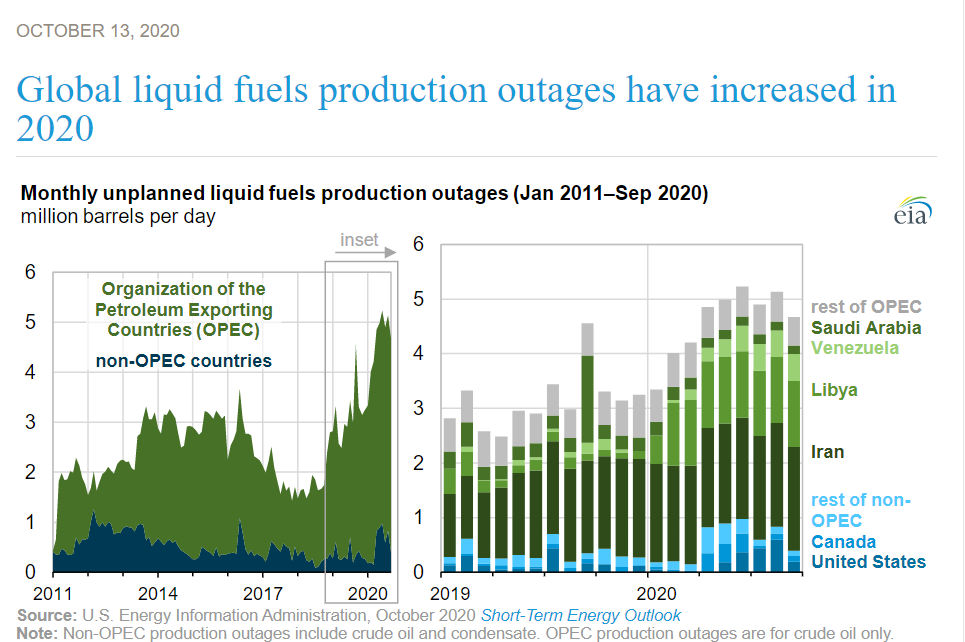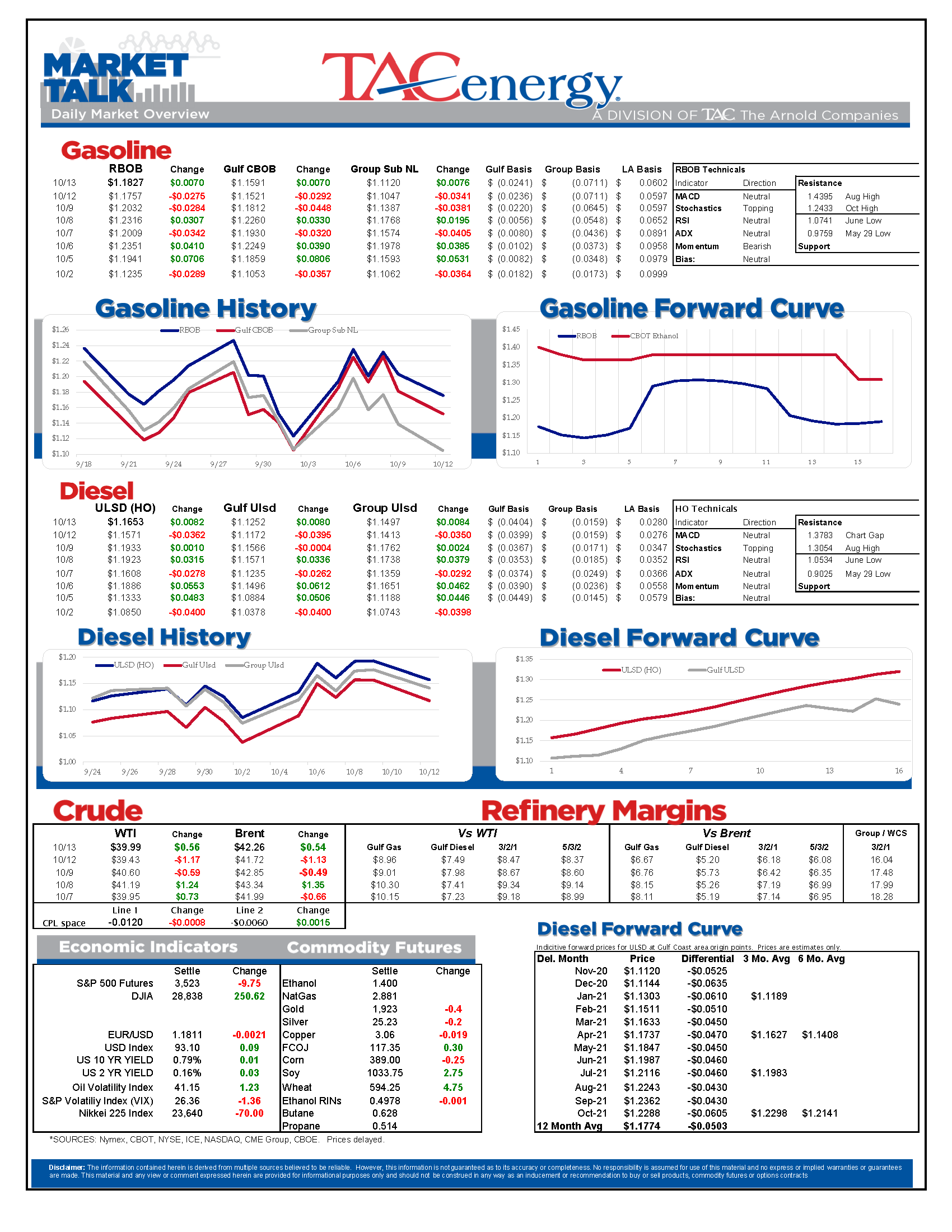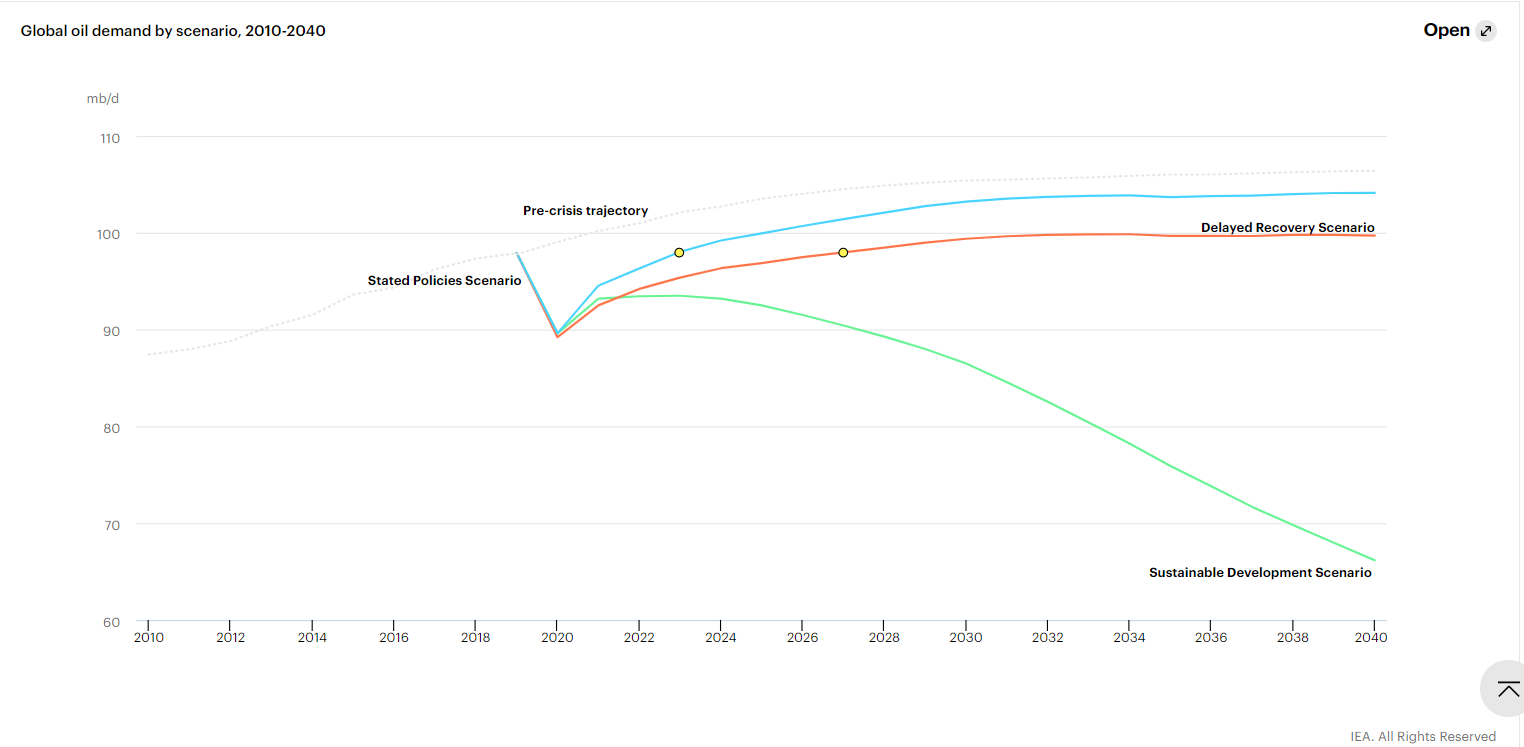Unplanned Outages Of Crude Oil Globally

There is more back and forth action for energy markets this week, leaving most contracts stuck in the sideways pattern that’s held them since June. Yesterday, easing supply concerns had energy futures moving lower, and today it appears to be demand optimism that has them trying to rally.
A surge in Chinese trade activity reported for September is giving markets around the world a boost as it sheds an optimistic light on the economic recovery from COVID, even as equity markets are taking a breather after a major vaccine trial hit a speed bump.
Early reports from Lake Charles suggest that both the Citgo and P66 refineries avoided major damage from Delta, and will restart operations within the next couple of weeks. Colonial pipeline confirmed its mainlines were both back in service as of Sunday night, which means we should not see any major supply issues from this storm.
The relative lack of movement in both futures and basis prices compared to previous years when multiple hurricanes hit refining country demonstrates how COVID-related demand destruction has created a substantial buffer for domestic fuel supply.
The IEA published its long term World Energy Outlook, highlighting several scenarios for both COVID recovery and environmental policies and how they’ll impact the supply & demand balance globally. The general theme, as with many IEA reports, is that countries around the world need to do much more to reduce emissions.
An EIA note this morning demonstrates how much worse the global glut of oil supply would be if Iran, Libya and Venezuela weren’t facing huge declines in output. Unplanned outages for crude oil production globally are at their highest level in nearly a decade, primarily due to those three countries, and combined with voluntary run cuts in, are succeeding in rebalancing the world market.
A few notes from the IEA’s World Energy Outlook:
There is a disparity in many countries between the spending required for smart, digital and flexible electricity networks and the revenues available to grid operators, creating a risk to the adequacy of investment under today’s regulatory structures.
Rising incomes in emerging market and developing economies create strong underlying demand for mobility, offsetting reductions in oil use elsewhere. But transport fuels are no longer a reliable engine for growth. Upward pressure on oil demand increasingly depends on its rising use as a feedstock in the petrochemical sector.
Not all the shifts in consumer behavior disadvantage oil. It benefits from a near-term aversion to public transport, the continued popularity of SUVs and the delayed replacement of older, inefficient vehicles.
The U.S. shale industry has met nearly 60% of the increase in global oil and gas demand over the last ten years, but this rise was fueled by easy credit that has now dried up. So far in 2020, leading oil and gas companies have reduced the reported worth of their assets by more than $50 billion.
Over the next ten years, lower emissions from urban power plants, residential heating units and industrial facilities in the SDS lead to falls of 45-65% in concentrations of fine particulate matter in cities, and cleaner transportation also brings down other street-level pollutants.
Click here to download a PDF of today's TACenergy Market Talk.
News & Views
View All
Energy Futures Are Caught Up In Headline Tug-O-War This Morning
Energy futures are caught up in headline tug-o-war this morning with Canadian oil production concerns and a positive US GDP report trying to push prices higher while sinking Chinese demand worries and Gaza ceasefire hopes are applying downward pressure. The latter two seem to be favored more so far this morning with WTI and Brent crude oil futures down ~45 cents per barrel, while gasoline and diesel prices are down about half a cent and two cents, respectively.
No news is good news? Chicago gasoline prices dropped nearly 30 cents yesterday, despite there not being any update on Exxon’s Joliet refinery after further damage was discovered Wednesday. Its tough to say if traders have realized the supply situation isn’t as bad as originally thought or if this historically volatile market is just being itself (aka ‘Chicago being Chicago’).
The rain isn’t letting up along the Texas Gulf Coast today and is forecasted to carry on through the weekend. While much of the greater Houston area is under flood watch, only two refineries are within the (more serious) flood warning area: Marathon’s Galveston Bay and Valero’s Texas City refineries. However, notification that more work is needed at Phillip’s 66 Borger refinery (up in the panhandle) is the only filing we’ve seen come through the TECQ, so far.
Premiums over the tariff on Colonial’s Line 1 (aka linespace value) returned to zero yesterday, and actually traded in the negatives, after its extended run of positive values atypical of this time of year. Line 1’s counterpart, Line 2, which carries distillates from Houston to Greensboro NC, has traded at a discount so far this year, due to the healthy, if not over-, supply of diesel along the eastern seaboard.
Click here to download a PDF of today's TACenergy Market Talk.

WTI And Brent Crude Oil Futures Are Trading ~$1.50 Per Barrel Lower In Pre-Market Trading
The across-the-board drawdown in national energy stockpiles, as reported by the Department of Energy yesterday, stoked bullish sentiment Wednesday and prompt month gasoline, diesel, and crude oil futures published gains on the day. Those gains are being given back this morning.
The surprise rate cut by the People’s Bank of China is being blamed for the selling we are seeing in energy markets this morning. While the interest rate drop in both short- and medium-term loans won’t likely affect energy prices outright, the concern lies in the overall economic health of the world’s second largest economy and crude oil consumer. Prompt month WTI and Brent crude oil futures are trading ~$1.50 per barrel lower in pre-market trading, gasoline and diesel are following suit, shaving off .0400-.0450 per gallon.
Chicagoland RBOB has maintained its 60-cent premium over New York prices through this morning and shows no sign of coming down any time soon. Quite the opposite in fact: the storm damage, which knocked Exxon Mobil’s Joliet refinery offline on 7/15, seems to be more extensive than initially thought, potentially extending the repair time and pushing back the expected return date.
There are three main refineries that feed the Chicago market, the impact from one of them shutting down abruptly can be seen in the charts derived from aforementioned data published by the DOE. Refinery throughput in PADD 2 dropped 183,000 barrels per day, driving gasoline stockpiles in the area down to a new 5-year seasonal low.
While it seems all is quiet on the Atlantic front (for now), America’s Refineryland is forecasted to receive non-stop rain and thunderstorms for the next four days. While it may not be as dramatic as a hurricane, flooding and power outages can shut down refineries, and cities for that matter, all the same, as we learned from Beryl.




